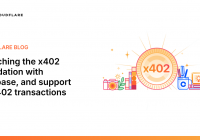Cynthia Lummis Revolutionizes Real Estate: Cryptos Soon Accepted for US Mortgage Loans
American Senator Cynthia Lummis officially introduced the 21st Century Mortgage Act, a groundbreaking legislation that would require government-sponsored enterprises to consider cryptos when assessing eligibility for single-family mortgage loans.

In brief
- The Lummis bill wants to include cryptos in mortgage loan eligibility.
- Fannie Mae and Freddie Mac should develop standards to assess crypto portfolios.
- This initiative could set a global precedent and accelerate mainstream adoption.
This initiative marks a historic turning point in integrating cryptocurrencies into the traditional US financial system, aligning with an international trend already underway in France where crypto assets can serve as collateral for Lombard loans since April 2025.
A bill targeting the crypto generation
This new bill by Senator Lummis would allow long-held crypto assets to count towards mortgage eligibility, specifically targeting young buyers native to the crypto world. This approach acknowledges a major demographic reality: an entire generation of Americans now holds a significant part of their wealth in cryptocurrencies.
Senator Lummis justifies this initiative with an alarming observation: “The American dream of homeownership is not a reality for many young people.” By allowing the inclusion of crypto-assets in eligibility criteria, this legislation could unlock mortgage access for thousands of crypto investors previously penalized by the traditional financial system.
This proposal follows that of Representative Nancy Mace, with the two legislators seeking to codify into law an order from the US Federal Housing Finance Agency (FHFA) from June. This bipartisan convergence highlights the perceived urgency to adapt the US mortgage system to new wealth realities.
Fannie Mae and Freddie Mac in the sights
The Lummis bill would codify an order from a US government housing agency to evaluate cryptocurrencies. Concretely, this would require the mortgage refinancing giants Fannie Mae and Freddie Mac to develop standardized evaluation methods for crypto portfolios.
This regulatory shift is part of a broader movement of institutional recognition of digital assets. While Bitcoin and Ethereum ETFs are now accepted by the SEC, integrating cryptos into mortgage criteria represents the next logical step of this institutionalization.
The impact could be considerable: Fannie Mae and Freddie Mac guarantee or hold about 60% of US mortgage loans, giving massive scope to any change in their eligibility criteria.
The expanding ecosystem of tokenized real estate
This legislative proposal comes at a time when tokenized real estate is experiencing rapid growth. Platforms like RealT, which combine the advantages of real estate and cryptos to offer tokenized opportunities to investors, already demonstrate the viability of the intersection between blockchain and real estate.
RealT offers to leverage DeFi’s power to borrow or sell in a decentralized way, creating a parallel ecosystem where traditional real estate meets decentralized finance. Since 2019, RealT has been selling tokenized real estate properties on the blockchain, allowing investors to buy fractions of ownership at very affordable prices starting from 50 dollars.
This fractional approach prefigures the evolution that the traditional mortgage market could experience. If crypto-assets become acceptable as collateral, we could see the emergence of new hybrid models combining traditional loans and DeFi mechanisms.
Technical and regulatory implications
Implementing this legislation raises considerable technical challenges. How to evaluate the volatility of a crypto portfolio? What discount mechanisms to apply depending on the assets? These questions will require complex regulatory developments.
Precedents already exist in the private sector. Some European banks already accept Bitcoin as collateral for loans, establishing strict coverage ratios and margin call mechanisms. Adapting these models to the US mortgage market represents a major challenge.
Volatility remains the main obstacle. Unlike traditional assets, cryptocurrencies can lose 50% of their value in a few weeks. Regulators will likely require very conservative coverage ratios, potentially limiting the appeal of the system.
Reactions from the traditional financial sector
The American banking industry watches this development with a mix of interest and apprehension. On one hand, integrating cryptos could open new customer segments and revenue sources. On the other, it considerably complicates risk management.
Large banks like JPMorgan Chase and Bank of America, which have already developed crypto services for their institutional clients, seem better positioned to adapt to this evolution. Smaller institutions may struggle to develop the necessary technical expertise.
This asymmetry could accelerate the consolidation of the American banking sector, with crypto-compatible institutions gaining a competitive advantage over traditional players.
A precedent for mainstream adoption
Beyond technical considerations, this initiative represents a major political signal. Cynthia Lummis, widely regarded as the strongest ally of the crypto industry in Congress, uses her influence to normalize the use of cryptocurrencies in the real economy.
This pragmatic approach contrasts with the ideological debates that long characterized crypto discussions in Washington. By focusing on a concrete use case: homeownership, the senator avoids controversies while advancing the crypto agenda.
The timing is strategic. With the Trump administration favorable to cryptos and a potentially more receptive Congress, this legislation has real chances of passing. Its success could catalyze other similar initiatives in other sectors.
Challenges and opportunities for the crypto ecosystem
This evolution would create major opportunities for the American crypto ecosystem. Institutional custody platforms, crypto valuation services, and consultants specializing in digital asset assessment would see their market explode.
Players like RealT, who have raised 5 million dollars to develop their real estate tokenization platform and already combine real estate and decentralized finance, could benefit from considerable network effects.
However, this integration also imposes new responsibilities. The crypto industry will have to develop transparency and reporting standards compatible with banking regulatory requirements. A necessary professionalization, but potentially costly.
Evolution prospects and international impacts
The success of this American initiative could influence other jurisdictions. The European Union, with MiCA , and the United Kingdom are closely watching the American regulatory developments. Successful adoption in the US would legitimize the approach for other markets.
The impact on cryptocurrency prices could be substantial. Opening a major new use case: mortgage collateral, would create additional structural demand, particularly for well-established assets like Bitcoin and Ethereum.
This evolution fits into a broader trend of “financialization” of cryptocurrencies, which are gradually moving from speculative assets to mainstream financial instruments. An inevitable process, but one that fundamentally transforms the nature of this ecosystem.
The bill does not yet specify which assets would be eligible, but Bitcoin and Ethereum appear to be the most likely candidates given their regulatory recognition.
Significant discounting mechanisms and margin calls would likely be necessary, similar to current practices of private crypto lenders.
The legislative process can take several months or even years, but the current political environment seems favorable to its adoption.
Indirectly yes, by legitimizing the intersection between crypto and real estate, this law could accelerate the adoption of real estate tokenization platforms.
No, it would only concern loans guaranteed by Fannie Mae and Freddie Mac, about 60% of the US mortgage market.
Disclaimer: The content of this article solely reflects the author's opinion and does not represent the platform in any capacity. This article is not intended to serve as a reference for making investment decisions.
You may also like
Crypto markets tumble amid US regional bank stress, prolonged government shutdown

EIGEN Large Unlock Incoming: 10% Market Cap Dilution Each Month, Smart Money Exits Early
The article, based on on-chain data analysis, points out that the recent sharp decline of the $EIGEN token (a 53% plunge on October 10) is not merely a result of market panic, but rather a manifestation of a deeper underlying issue. The real core risk lies in the massive and continuous token unlocks over the next two years, which will exert tremendous selling pressure. The smartest and most profitable traders had already anticipated this and systematically exited their positions weeks before the market crash.

How does market microstructure determine the real movement of candlestick charts?

Which crypto and AI projects will take the lead in the x402 payment protocol?

